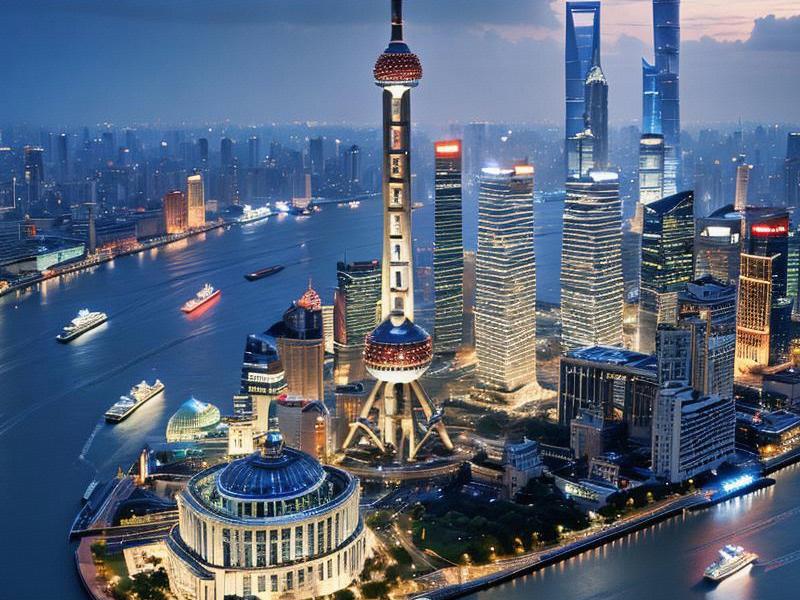This article delves into the remarkable transformation of Shanghai from a small fishing village to a global metropolis, highlighting its evolution as an economic powerhouse and a cultural melting pot. It explores the city's architectural marvels, its vibrant cultural scene, and its strategic role in global trade and finance.

Nestled along the banks of the Huangpu River, Shanghai stands as a testament to China's rapid urbanization and economic rise. Once a modest fishing village, the city has undergone a profound metamorphosis, emerging as one of the world's most dynamic and influential urban centers. This article embarks on a journey through Shanghai's past, present, and future, shedding light on its unique blend of tradition and modernity.
The history of Shanghai is deeply intertwined with its strategic location at the mouth of the Yangtze River, which has made it a vital hub for trade and commerce for centuries. During the 19th century, the city became a treaty port, opening its doors to foreign trade and influence. This period of colonialism left an indelible mark on Shanghai's architecture, with the city's skyline now graced by a mix of historic Shikumen buildings and modern skyscrapers.
One of the most iconic symbols of Shanghai's transformation is the Bund, a waterfront area that showcases the city's colonial past. Lined with grandiose buildings from the early 20th century, the Bund offers a striking contrast to the futuristic skyline of Pudong, located just across the river. Pudong's rise is a testament to Shanghai's ambition and vision, with landmarks such as the Oriental Pearl Tower, the Jin Mao Tower, and the Shanghai Tower symbolizing the city's status as a global financial hub.
Shanghai's economic prowess is not solely defined by its skyscrapers and financial district. The city is also a major manufacturing and export center, playing a pivotal role in China's economy. Its well-developed infrastructure, including one of the busiest ports in the world, facilitates seamless trade and commerce. Additionally, Shanghai is home to a burgeoning technology sector, with numerous startups and tech companies driving innovation and growth.
爱上海同城419 Beyond its economic achievements, Shanghai is a vibrant cultural melting pot, offering a rich tapestry of experiences for residents and visitors alike. The city boasts a diverse range of cultural attractions, from world-class museums and art galleries to traditional Chinese temples and modern entertainment venues. The Shanghai Museum, for instance, is renowned for its extensive collection of ancient Chinese art, while the Power Station of Art showcases contemporary Chinese art.
The city's culinary scene is another highlight, reflecting its cosmopolitan character. Shanghai cuisine, known for its sweet and savory flavors, is a must-try for food enthusiasts. From classic dishes like Xiaolongbao (soup dumplings) to innovative fusion creations, Shanghai's dining options cater to a wide range of tastes and preferences.
Shanghai's cultural vibrancy is further enriched by its festivals and events. The city hosts numerous cultural festivals throughout the year, including the Shanghai International Film Festival, which attracts filmmakers and cinephiles from around the globe. The Shanghai Fashion Week is another major event, showcasing the latest trends and designs from both domestic and international designers.
Education is a cornerstone of Shanghai's development, with the city boasting some of the best universities and research institutions in China. Fudan University and Tongji University are among the most prestigious institutions, attracting students from all over the world. Shanghai's commitment to education and innovation has contributed to its reputation as a global knowledge hub.
爱上海419论坛
The city's rapid development has not been without challenges, particularly in terms of urban planning and sustainability. As Shanghai continues to grow, it faces the pressing need to balance economic progress with environmental conservation. The city has taken significant steps to address these challenges, implementing green initiatives and promoting sustainable urban development.
One notable example is the construction of the Shanghai Green Belt, a large-scale ecological project aimed at improving air quality and enhancing the city's green spaces. Additionally, Shanghai has invested heavily in public transportation infrastructure, including the expansion of its metro system, to reduce traffic congestion and promote eco-friendly commuting.
Shanghai's transformation is also reflected in its role on the global stage. As a member of the World Expo, the city has hosted several international expos, showcasing its achievements and fostering global cooperation. The 2010 World Expo, which attracted millions of visitors, was a landmark event that highlighted Shanghai's status as a global city.
419上海龙凤网 In recent years, Shanghai has emerged as a leader in digital transformation, embracing cutting-edge technologies such as artificial intelligence, big data, and the Internet of Things. The city's digital economy is thriving, with numerous tech companies and startups driving innovation and growth. Shanghai's commitment to digital transformation is part of its broader strategy to remain competitive in the global arena.
The future of Shanghai holds immense promise, with the city poised to continue its journey of urban renaissance and global influence. As Shanghai looks ahead, it faces both opportunities and challenges, including the need to address issues such as housing affordability, environmental sustainability, and social inequality.
Despite these challenges, Shanghai's resilience and adaptability have been key to its success. The city's ability to embrace change and innovate has enabled it to maintain its position as a global leader in various fields. As Shanghai continues to evolve, it remains a beacon of hope and inspiration for cities around the world.
In conclusion, Shanghai's transformation from a small fishing village to a global metropolis is a remarkable story of urban renaissance and global influence. The city's unique blend of tradition and modernity, coupled with its economic prowess and cultural vibrancy, makes it a truly unique destination. As Shanghai looks to the future, it is poised to continue its journey of growth and innovation, solidifying its status as one of the world's most dynamic and influential cities.